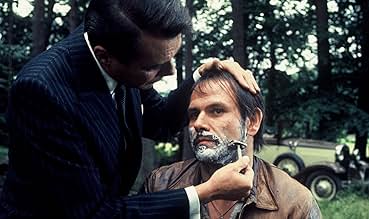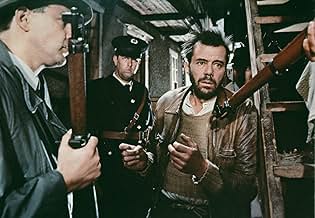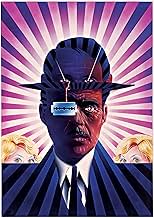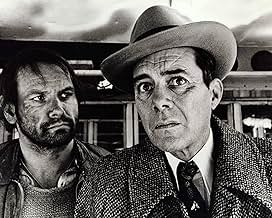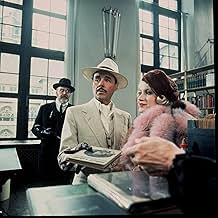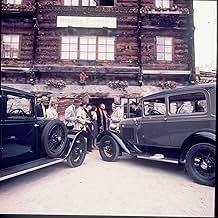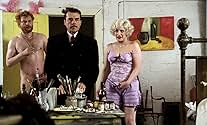Adicionar um enredo no seu idiomaIn early-1930s Berlin, an elegant Russian émigré and eccentric chocolatier convinces himself that he has seen his doppelgänger, and hatches a murderous plan to trade his existence for an ent... Ler tudoIn early-1930s Berlin, an elegant Russian émigré and eccentric chocolatier convinces himself that he has seen his doppelgänger, and hatches a murderous plan to trade his existence for an entirely new one. Will he get over the deep despair?In early-1930s Berlin, an elegant Russian émigré and eccentric chocolatier convinces himself that he has seen his doppelgänger, and hatches a murderous plan to trade his existence for an entirely new one. Will he get over the deep despair?
- Direção
- Roteiristas
- Artistas
- Prêmios
- 3 vitórias e 1 indicação no total
- Innkeeper
- (não creditado)
- Direção
- Roteiristas
- Elenco e equipe completos
- Produção, bilheteria e muito mais no IMDbPro
Avaliações em destaque
I gave this movie 6 stars because in the last 40 minutes, movie got back on track. Finally it starts to make sense, it was even exciting at some point. I didn't understand everything i was watching but it was interesting and that's all that matters.
Still, i can't recommend it.
Vladimir Nabokov wrote his novel "Despair" as a spoof of Dostoyevsky's "Crime and Punishment." The script includes lines referring to Dostoyevsky and Arthur Conan Doyle. "Despair" the film falls short of achieving/adapting the greatness of Dostoevsky or Conan Doyle. It is possibly because for Nabokov and Fassbinder the mental state of Herman (Bogarde) is paramount than the tale itself.
The audience struggles to come to terms with a clean shaven Herman suddenly sporting an elegant moustache in between sequences. If it was a fake moustache, the audience is not prepared for it by Fassbinder. Or were scenes edited out in the final cut?
Fassbinder was evidently quite familiar with Nabokov. Nabokov wrote Lolita with a lead character named Humbert Humbert. Fassbinder extrapolates the idea in "Despair" (or was it Stoppard?) by calling the lead character in "Despair" Herman Hermann, when Nabokov called him just Herman.
If there was one outstanding aspect in this film it was cinematographer Michael Ballhaus working with mirrors and glass panes in doors. One great shot, creditable to Fassbinder and Ballhaus, was of two Jews continuing to play chess at the street cafe as a Jewish shop is attacked by Nazis followed much later in the film by a distinctly similar shot of the same Jewish duo playing chess with non-distinctive clothes.
Another important aspect of the film is Fassbinder 's dedication of this quaint work to three mentally unstable geniuses: Antonin Artaud (the actor/playwright who introduced The Theatre of Cruelty) , Vincent Van Gogh (the painter who cut off his ear) and Unica Zurn (a painter famous for her paintings of torsos bound with string). And lastly several actors in this film and those supposed to play originally in the film were openly gay as was the director..
Você sabia?
- CuriosidadesThis movie cost more than all of Director Rainer Werner Fassbinder's previous movies combined.
- Erros de gravaçãoThough the movie is set in Weimar Germany in the early 1930s, at 1:15:15, Hermann Hermann smokes a filtered cigarette, and those were put on the market in the 1950s.
- Citações
Lydia: What's that accident all about?
Herman: What accident?
Lydia: In America. Why should it matter to you?
Herman: It doesn't say anything about an accident... it says just to go crash. Collapse!
Lydia: The whole street collapsed?
Herman: Wall Street.
Lydia: Were people killed?
Herman: Just a few. Mostly jumping out of windows. Nearly all of them were stock holders.
Lydia: Oh, Hermann...
Herman: Really, you are such a... such a stupid woman, Lydia. You've lived here for 7 years already and you still can't speak the language properly. Still, I don't mind. Inteligence would take the bloom off your carnality. No, a woman like you should keep moist and plump.
- ConexõesFeatured in Dirk Bogarde: By Myself (1992)
Principais escolhas
- How long is Despair?Fornecido pela Alexa
Detalhes
Bilheteria
- Orçamento
- DEM 6.000.000 (estimativa)
- Faturamento bruto nos EUA e Canadá
- US$ 8.144
- Fim de semana de estreia nos EUA e Canadá
- US$ 11.623
- 16 de fev. de 2003
- Faturamento bruto mundial
- US$ 8.158
- Tempo de duração
- 1 h 59 min(119 min)
- Mixagem de som
- Proporção
- 1.66 : 1


